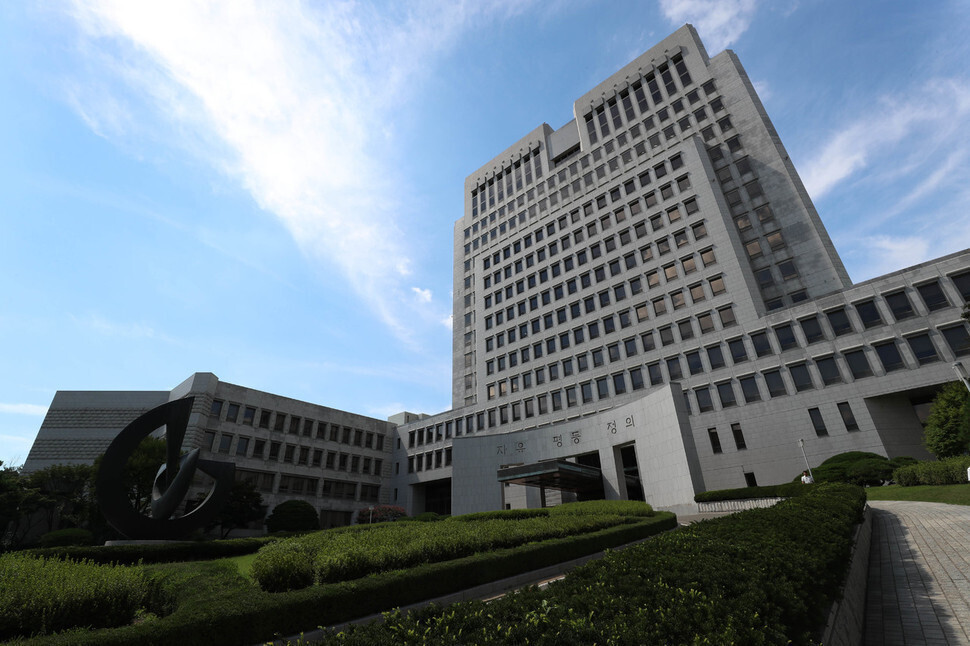hankyoreh
Links to other country sites 다른 나라 사이트 링크
S. Korea’s COVID-19 outbreak infiltrates its court system

South Korea’s renewed COVID-19 outbreak has courts sounding the alarm. After a district court judge tested positive for the virus, even senior members of the National Court Administration (NCA) have become exposed to the threat of infection.
On Aug. 25, the NCA announced that the wife of a deputy director-general in the Planning and Coordination Office, identified as “A,” recently tested positive for the virus. “A” underwent testing that morning and tested negative in the afternoon. In the meantime, 35 people who had been in contact with “A” -- including NCA Minister Cho Jae-youn, Vice Minister Kim In-gyeom, and Planning and Coordination Office Director Hong Dong-gi -- waited at their homes. Cho and Kim were unable to attend meetings of the National Assembly Legislation and Judiciary Committee and of the Special Committee on Budget and Accounts that had been scheduled for that day.
“The Supreme Court issued orders to refrain from movement between offices and keep in-person meetings to a minimum,” an NCA official said. Senior officials and employees had previously been tested or entered self-quarantine as close contacts after the positive tests of a Jeonju District Court chief judge on Aug. 21 and a Judicial Research and Training Institute staffer on Aug. 23.
NCA issues recommendation to “postpone all trials not involving urgent cases
But the courts’ real concern is the possibility of the virus spreading inside the courtroom. On Aug. 24, the NCA issued a recommendation for all South Korean courts to “postpone all trials that do not involve urgent cases.” Trials for most regular cases have been postponed as a result, while major cases are being tried as scheduled. The Seoul Central District Court announced that trials were continuing in cases involving Dongyang University professor Chung Kyung-shim (wife of former Minister of Justice Cho Kuk), South Gyeongsang Gov. Kim Kyoung-soo, and former NCA Vice Minister Im Jong-heon.
A Seoul Central District Court official explained, “We’re conducting trials only in cases where it’s unavoidable because failure to question witnesses as scheduled would result in a domino effect of delays to other witness questioning and cause a general delay in trial schedules.”
The courts have also stepped up their disease prevention efforts. Thermal imaging cameras have been installed at the entrance of the Seoul Central District Court to monitor body temperatures in real time, while outside visitors have been restricted to the restaurant and café within the court complex. Transparent partitions have been installed in courtrooms, while gallery visitors sit one seat apart from each other.
But fears of the virus’s transmission have been raised by the fact that some judges do not wear a mask while conducting trials in the courtroom. At one court in the Greater Seoul area late last month, a trial under one judge was attended by an individual who subsequently tested positive. That judge and other employees present in the court that day took an official holiday to undergo testing; all of them tested negative.
The same judge, who had not been wearing a mask at the time, was also observed not wearing a mask in the courtroom after returning to duty. A transparent partition is positioned around the judge’s bench. A visitor who attended the trial at the time said, “The judge wasn’t wearing a mask, and the prosecutor didn’t have one on either. The defendant, the attorneys, and the witnesses all wore masks.”
“Meanwhile, the judge was coughing and blowing his nose in the courtroom,” the visitor recalled.
By Jang Pil-su, Chai Yoon-tae, and Joh Yun-yeong, staff reporters
Please direct comments or questions to [english@hani.co.kr]
Editorial・opinion
![[Column] Samsung’s ‘lost decade’ and Lee Jae-yong’s mismatched chopsticks [Column] Samsung’s ‘lost decade’ and Lee Jae-yong’s mismatched chopsticks](https://flexible.img.hani.co.kr/flexible/normal/500/300/imgdb/original/2024/0512/3017154788490114.jpg) [Column] Samsung’s ‘lost decade’ and Lee Jae-yong’s mismatched chopsticks
[Column] Samsung’s ‘lost decade’ and Lee Jae-yong’s mismatched chopsticks![[Correspondent’s column] The real reason the US is worried about Chinese ‘overcapacity’ [Correspondent’s column] The real reason the US is worried about Chinese ‘overcapacity’](https://flexible.img.hani.co.kr/flexible/normal/500/300/imgdb/original/2024/0510/5217153290112576.jpg) [Correspondent’s column] The real reason the US is worried about Chinese ‘overcapacity’
[Correspondent’s column] The real reason the US is worried about Chinese ‘overcapacity’- [Editorial] Yoon’s gesture at communication only highlights his reluctance to change
- [Editorial] Perilous stakes of Trump’s rhetoric around US troop pullout from Korea
- [Guest essay] Preventing Korean Peninsula from becoming front line of new cold war
- [Column] The state is back — but is it in business?
- [Column] Life on our Trisolaris
- [Editorial] Penalties for airing allegations against Korea’s first lady endanger free press
- [Editorial] Yoon must halt procurement of SM-3 interceptor missiles
- [Guest essay] Maybe Korea’s rapid population decline is an opportunity, not a crisis
Most viewed articles
- 1[Column] Samsung’s ‘lost decade’ and Lee Jae-yong’s mismatched chopsticks
- 2[Correspondent’s column] The real reason the US is worried about Chinese ‘overcapacity’
- 3[Book review] Who said Asians can’t make some good trouble?
- 4Seoul’s plan to adopt SM-3 missiles is like wanting a sledgehammer to catch a fly
- 5Behind bellicose bluster, N. Korea is turning airfields into greenhouse farms
- 6[Editorial] Human trafficking in S. Korea
- 7Report documents instances of lonely deaths in South Korean society
- 8[Column] “Hoesik” as ritual of hierarchical obedience
- 9Yoon’s broken-compass diplomacy is steering Korea into serving US, Japanese interests
- 10In Yoon’s Korea, a government ‘of, by and for prosecutors,’ says civic group